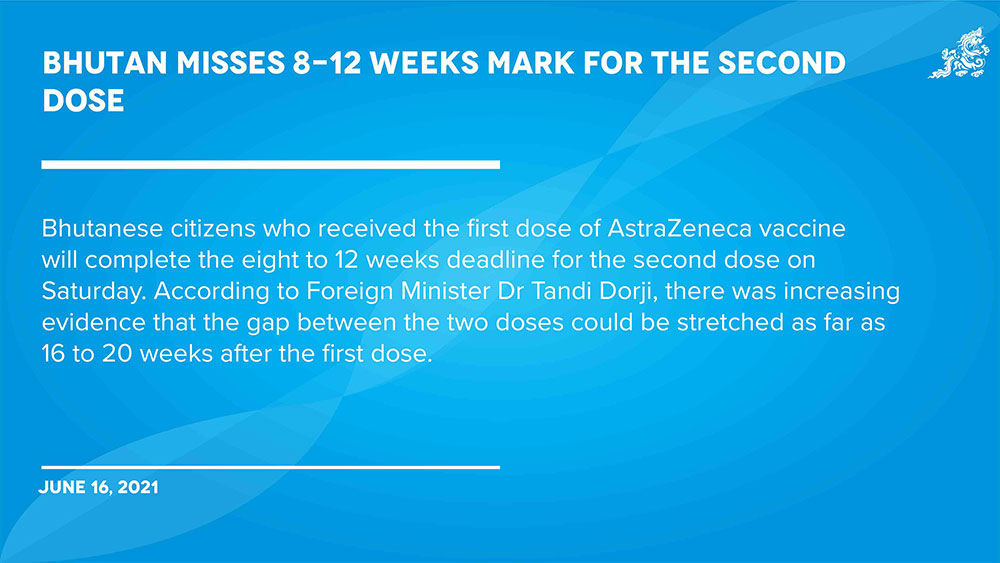However, according to foreign minister, new evidence finds the vaccines are effective even after 16-20 weeks from the first dose
Bhutan will complete week-12 after administering the first dose of AstraZeneca vaccine on Saturday. Those who have received the first dose of the vaccine will miss the initial deadline — eight to 12 weeks — for the second shot.
With an increasing number of positive cases in the country, the sense of urgency among the public for the second dose is growing. Queries on the status of the second dose and the government’s efforts to procure vaccines have been raised for at least three times at the ongoing National Assembly session.
Responding to Lamgong-Wangchang MP Ugyen Tshering’s question on the same, Chidrel Lyonpo (foreign minister) Dr Tandi Dorji said that given the level of efforts put in to procure the second dose, Bhutan is expected to receive the vaccines soon.
Lyonpo said that the international assistance desk of the foreign ministry was actively working with multilateral and bilateral partners to secure AstraZeneca vaccines for the second dose. “Discussions are ongoing with at least 17 countries and we are very hopeful to receive assistance from them, especially Japan, Denmark, and the United States.”
The minister added that although the initial recommendation for the second dose for AstraZeneca vaccine was between eight to 12 weeks, there was increasing evidence that the gap between could be stretched as far as 16 to 20 weeks after the first dose.
He said that globally the vaccines were short in supply. However, efforts were underway to secure the second dose. “As the vaccines are found still effective beyond 12 weeks, we will make sure all eligible people in the country receive the vaccines within these 16 to 20 weeks.”
This means the second dose would be made available only toward the end of July or midway August.
Officials from the national immunization technical advisory group (NI-TAG) said that delay in the second dose of vaccine by a few weeks would not have any implication. In fact, immunologically, officials said that the longer the duration between the two doses, the better the immune response.
However, officials did not comment as to how long the gap could be extended to.
Officials said that for the AstraZeneca vaccine, the efficacy of the first dose was around 76 percent. With the booster dose, the efficacy increased to around 81 percent. This meant that even without the booster dose, people would have already developed adequate levels of antibodies from the first dose.
A booster dose, officials said, was important for certain individuals who would not have developed adequate levels of antibodies from the first, including those with pre-existing medical conditions.
Indian experts, in the light of the overwhelming positive cases and deaths because of the second wave of the pandemic, extended the gap from eight to 12 weeks to 16 weeks. However, the World Health Organisation’s protocol for AstraZeneca vaccine, as of last night, still reflected eight to 12 weeks.
In the meantime, Public Health England, an executive agency of the Department of Health and Social Care in the UK published that two doses of the Pfizer-BioNTech or the AstraZeneca vaccines were highly effective against hospitalisation from the Delta variant of the coronavirus.
Their recent analysis found that two doses of the Pfizer vaccine were 96 percent effective against hospitalisation from the Delta variant; two doses of the AstraZeneca vaccine were 92 percent effective.
By Younten Tshedup
Edited by Jigme Wangchuk


